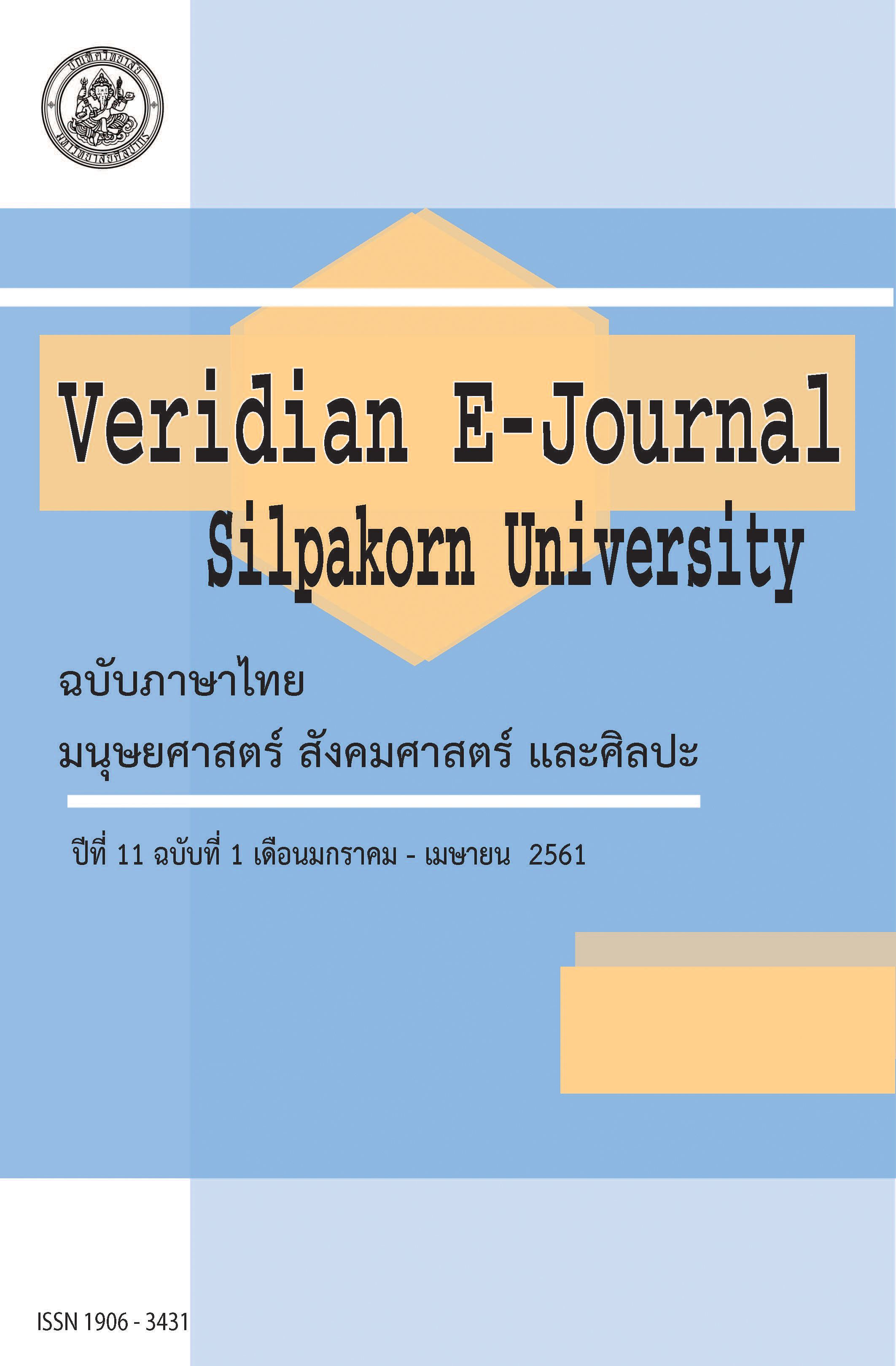รูปแบบการพัฒนาอาชีพพืชผักอินทรีย์ของครอบครัวไทยเพื่อการพัฒนาที่ยั่งยืน (The Model of Organic Vegetable Career Development of Thai Family for Sustainable Development)
Main Article Content
Abstract
การวิจัยครั้งนี้มีวัตถุประสงค์เพื่อศึกษาสภาพการดำเนินงาน ปัจจัยที่ส่งผลต่อความสำเร็จในการพัฒนาอาชีพพืชผักอินทรีย์ วิธีการปฏิบัติที่เป็นเลิศ และพัฒนารูปแบบการพัฒนาอาชีพพืชผักอินทรีย์ของครอบครัวไทยเพื่อการพัฒนาที่ยั่งยืน ซึ่งใช้วิธีการวิจัยแบบผสมผสาน ระหว่างการวิจัยเชิงปริมาณและการวิจัยเชิงคุณภาพโดยเป็นการวิจัยรายกรณีในลักษณะของพหุเทศะกรณีศึกษา กลุ่มตัวอย่างที่ใช้ในการวิจัยคือ สมาชิกกลุ่มอาชีพพืชผักอินทรีย์ จำนวน 238 คน ผู้ให้ข้อมูลสำคัญ จำนวน 36 คน และผู้ทรงคุณวุฒิจำนวน 15 คน เครื่องมือที่ใช้ในการวิจัยคือ แบบสอบถาม แบบประเมินรูปแบบ แบบวิเคราะห์เอกสาร แบบสังเกต ประเด็นการสนทนากลุ่มย่อย และแบบสัมภาษณ์ และการวิเคราะห์ข้อมูลใช้การแจกแจงความถี่ ค่าร้อยละ ค่าเฉลี่ย ค่าเบี่ยงเบนมาตรฐาน การวิเคราะห์การถดถอยพหุคูณ และการวิเคราะห์เนื้อหา
ผลการวิจัย พบว่า สภาพการดำเนินงานของกลุ่มอาชีพพืชผักอินทรีย์มีการรวมกลุ่มเพื่อพัฒนาอาชีพพืชผักอินทรีย์ซึ่งกลุ่มอาชีพพืชผักอินทรีย์มีการบริหารในรูปคณะกรรมการ รวมทั้งมีกฎระเบียบสำหรับใช้เป็น แนวปฏิบัติ สำหรับปัจจัยที่ส่งผลต่อความสำเร็จในการพัฒนาอาชีพพืชผักอินทรีย์ของครอบครัวไทย เพื่อการพัฒนาที่ยั่งยืน ได้แก่ 1) การปฏิบัติที่ดีในฟาร์ม 2) กระบวนการเรียนรู้ 3) ปริมาณการผลิต 4) คุณภาพผลผลิต 5) การวางแผนการผลิต 6) การจัดการหลังการเก็บเกี่ยวผลผลิต 7) การตลาดที่ตอบสนองความต้องการของผู้บริโภค 8) การมีส่วนร่วมภายในกลุ่ม 9) ระบบมาตรฐานรับรองการผลิต 10) การจัดองค์กร 11) การบริหารจัดการ และ 12) การสนับสนุนจากหน่วยงาน ส่วนวิธีการปฏิบัติที่เป็นเลิศของการพัฒนาอาชีพพืชผักอินทรีย์ของครอบครัวไทยเพื่อการพัฒนาที่ยั่งยืน ได้แก่ 1) การรวมกลุ่มอาชีพพืชผักอินทรีย์ 2) การวางแผนการผลิต 3) การบริหารจัดการที่ดี 4) การปฏิบัติที่ดีในฟาร์ม 5) ตลาดที่มั่นคงและ ช่องทางการตลาดหลายช่องทางในการเข้าถึงผู้ซื้อ/ผู้บริโภค และ 6) กระบวนการเรียนรู้ สำหรัรูปแบบการพัฒนาอาชีพพืชผักอินทรีย์ของครอบครัวไทยเพื่อการพัฒนาที่ยั่งยืน ประกอบด้วย 1) หลักการ2) วัตถุประสงค์ 3) ปัจจัยสนับสนุน 4) ปัจจัยนำเข้า ประกอบด้วย (1) ทุนมนุษย์ (2) ทุนทรัพยากร (3) ทุนทางปัญญา และ (4) ทุนทางสังคม 5) กระบวนการโดยให้ความสำคัญกับการดำเนินการ 12 ประการ ได้แก่ (1) การวางแผนการผลิต (2) ระบบมาตรฐานรับรองการผลิต (3) กระบวนการเรียนรู้ (4) การมีส่วนร่วม ภายในกลุ่ม (5) การปฏิบัติที่ดีในฟาร์ม (6) ปริมาณการผลิต (7) คุณภาพผลผลิต (8) การจัดการหลังการเก็บเกี่ยวผลผลิต (9) การจัดองค์กร (10) การบริหารจัดการ (11) การตลาดที่ตอบสนองความต้องการของผู้บริโภค และ(12) การสนับสนุนจากหน่วยงาน และ 6) ผลลัพธ์ 3 ด้านคือ (1) ความยั่งยืนด้านสิ่งแวดล้อม (2) ความยั่งยืนด้านสังคม และ (3) ความยั่งยืนด้านเศรษฐกิจ ซึ่งผู้ทรงคุณวุฒิได้ให้การประเมินรับรองรูปแบบ โดยมีผลการประเมินภาพรวมของรูปแบบทั้ง 4 ด้านอยู่ในระดับมากถึงมากที่สุด
The purposes of this research were to study the performance conditions, the factors affected the success of organic vegetable career development, the best practices and to develop the model of organic vegetable career development of Thai family for sustainable development. The procedure employed the mixed methods research between quantitative research and qualitative research by means of case study research of multisite multicase studies. The samples used were 238 members of organic vegetable career groups, 36 key informants and 15 eminent persons. The instruments used questionnaire, evaluation form, documentary analysis form, observation form, focus group guideline and interview form. The data were analyzed by frequency distribution, percentage, mean, standard deviation, multiple regression analysis and content analysis.
The results of this research revealed that the performance conditions of organic vegetable career groups were to develop organic vegetable career. Organic vegetable career groups had managed in the form of official committee. Moreover, the regulations are regarded for the performance. The factors affected the success of organic vegetable career development of Thai family for sustainable development consisted of: 1) production planning, 2) organic standards certification system, 3) learning process, 4) participation in group,5) best practice in farm, 6) production quantity, 7) product quality, 8) post harvest management, 9) organization management, 10) administration management, 11) consumer needs marketing and 12) organization support. The best practices of organic vegetable career development of Thai family for sustainable development were 1) working group of organic vegetable career development, 2) production planning, 3) good administration management, 4) best practice in farm, 5) stable market and many marketing channels access to the consumers and 6) learning process. The model of organic vegetable career development of Thai family for sustainable development comprised: 1) Principle, 2) Objective, 3) Support Factors, 4) Input consisted of: (1) human capital; (2) resource capital; (3) intellectual capital; and (4) social capital, 5) Process consisted of 12 components: (1) production planning; (2) organic standards certification system; (3) learning process; (4) participation in group; (5) best practice in farm; (6) production quantity; (7) product quality; (8) post harvest management;(9) organization management; (10) administration management; (11) consumer needs marketing; and (12) organization support and 6) Outcome consisted of: (1) environment sustainability; (2) social sustainability; and (3) economic sustainability. Additionally,this model evaluation is certified by eminent persons that the overall model in four specific aspects were at the high to the highest level.
